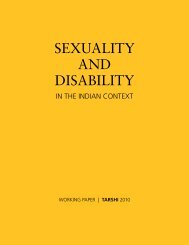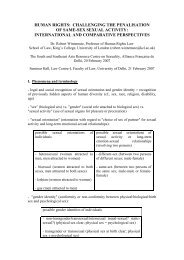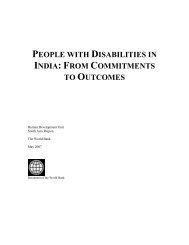FREE Download - TARSHI
FREE Download - TARSHI
FREE Download - TARSHI
You also want an ePaper? Increase the reach of your titles
YUMPU automatically turns print PDFs into web optimized ePapers that Google loves.
I. INTRODUCTION<br />
Sexuality is mediated through socio-cultural and psychological factors as well as biological capacity, and<br />
political ideologies and systems. This makes it a difficult subject to study. Additionally, because it is<br />
considered a personal and intimate part of life and is interwoven with myth, taboo and morals,<br />
it demands a highly sensitive research approach. Researching sexuality anywhere in the world, at any<br />
time, is challenging. In India, it is complicated by societal taboos that surround a discussion of issues<br />
of sexuality (Basu, 1994). However, despite or perhaps because of these difficulties, sexuality must be<br />
studied because it permeates most aspects of human existence.<br />
Sexuality is more than sexual behaviour. Sexuality encompasses eroticism, sexual behaviour, social and<br />
gender roles and identity, relationships, and the personal, social and cultural meanings that each of<br />
these might have. However, sexuality is often reduced to sexual behaviour. The study of sexual<br />
behaviour is important in itself, but is incomplete if divorced from the personal, social and cultural<br />
context in which it occurs. Views about sexuality are specific to a particular place, time and group of<br />
people. They keep changing, as do also the factors that govern the regulation of sexuality. An immediate<br />
example is that of how the HIV/AIDS pandemic has led to the extension of the notion of safer sex from<br />
that which prevents unwanted pregnancy to that which prevents the transmission of HIV. Khanna and<br />
Price (1994) trace the construction of female sexuality in India over the last two hundred years and point<br />
out that in the post-colonial era, constructions of sexuality are mediated by a combination of local,<br />
national and international influences. International donor and bilateral agencies have instituted a wide<br />
range of programmes including the Safe Motherhood Initiative, HIV/AIDS and STD (sexually transmitted<br />
disease) prevention, and population control programmes that directly relate to sexuality. Whilst, in<br />
theory, it is argued that no specific sexual practices should be denied, in reality, intervention<br />
programmes focus on a range of 'normative' sexual and reproductive behaviours that reinforce the<br />
stable, heterosexual, patriarchal family unit. Those who fall outside these norms have been the key<br />
targets of programmes - women who are perceived to bear too many children, men who have sex with<br />
men, and women who sell sex, for example.<br />
Research requires social acceptance as well as financial support. Consequently, the impetus for<br />
studying sexual behaviour has come from the fields of family planning and HIV/AIDS prevention.<br />
There has been an increase in the number of studies conducted in India on sexuality and sexual<br />
behaviour in the last decade, largely because of the growing numbers of people affected by HIV/AIDS<br />
and the fact that in India, the transmission of HIV is mainly through the sexual route. Sexual behaviour<br />
has also been studied in the context of reproductive health, primarily infection (reproductive tract<br />
infections and sexually transmissible infections) and contraceptive decision-making.<br />
Consequently, most research focuses on sexual behaviour, on who does what with whom, how many<br />
times, when, and whether precautions against disease and unwanted pregnancy are taken. Increased<br />
research on sexual behaviour has not been accompanied by a concomitant increase in the<br />
understanding of sexuality and how it plays out in lived experience. There is very little on the complex<br />
interrelationship of psychological, social, cultural and sexual life, and on the meaning of what happens<br />
and equally importantly, does not happen. What is even less explored and understood is how gender<br />
and power operate in affecting people's, especially women's, sexuality.<br />
1










